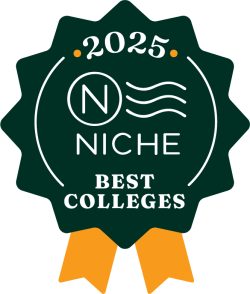Pursue a Career Working with Animals with Our Bachelor’s Degree in Zoology
Have you always had a passion for helping animals? Do you want to work with animals every day? Our Bachelor of Science in Zoology (pre-vet) is designed so that you can enter into the workforce upon graduation or apply to graduate school. At Liberty, our desire is to prepare you to enter into the field of zoology with confidence, knowing that you have received a world-class education.
Liberty University has become a training ground for young champions across the world. With our dedication to academic excellence and a biblical worldview, you can be sure you are receiving an excellent education. Whether you want to become a veterinarian, physician, zoo curator, or wildlife biologist, we are excited to partner with you as you take your next step in pursuing a career in animal care!
Award-Winning Campus
At Liberty, you’ll find an affordable, high-quality education that equips students like you for the real world. Our commitment to excellence helped us rank as the #4 Best College Campus in America by Niche.com. Earning your degree from a nonprofit university with state-of-the-art resources like ours can help set you apart from your peers.

Why Choose Liberty’s Bachelor’s of Zoology
At Liberty, we provide world-class education, seasoned professors who have real-world experience, and a curriculum that can help prepare you for your future. Our faculty is composed of professors who have doctoral degrees and years of experience in the field. They are industry leaders who desire to help guide and support you throughout your academic journey.
If you desire to become a veterinarian, the courses in our pre-vet bachelor’s degree can help as you apply to veterinary school. Our bachelor of zoology degree can also help prepare you to go into various industries. Whichever path you choose, Liberty seeks to prepare you for your next steps.
Another asset to our BS in Zoology program is the experience you can gain. Almost all of our biology and chemistry courses have associated labs, so you’ll get to put into practice the topics you’re learning in the classroom. You also have the option of participating in an internship, which can enrich and supplement your training wherever you go.
Frequently Asked Questions
How many years does it take to become a veterinarian?
What can I do with a zoology degree?
What Will You Learn in Our Zoology Degree?
In our zoology program, we want to equip you to enter a field where you can work directly with animals. If you are wanting to become a vet, our program is comparable to a pre-veterinary medicine track that is designed to help you succeed as you apply to graduate school. Some of the core courses you’ll take cover biology, chemistry, mathematics, and physics. You will be taking a blend of science, math, and social science courses so that you can be prepared for both veterinary school and other careers. Some of the courses you will take in this program include:
- Biology seminar
- Comparative animal physiology
- Ecology
- Genetics
View the Degree Completion Plan, and check out our featured courses below for more information on what you’ll be studying!
Featured Courses
BIOL 224 – General Biology
BIOL 310 – Ecology
BIOL 416 – Comparative Animal Physiology
Highlights of Our Zoology Degree
- As an undergraduate student, you may have opportunities to participate in research projects with faculty.
- Labs are associated with nearly every course in the Department of Biology and Chemistry, giving you hands-on experience in your field before graduation.
- You can specialize in molecular or organismal biology, or continue a general course of study in upper-level courses.
- Your courses and labs are taught by faculty with real-life experience and terminal degrees.
Zoology Degree Information
- Residential
- 120 total credit hours
- Transfer in up to 75% of your total degree
- This program falls under the School of Health Sciences.
- View our Degree Completion Plan.
- View our course catalog.
Career Opportunities for Zoology Graduates
- College professor/researcher
- Physician
- Veterinarian
- Veterinary technician
- Wildlife biologist
- Zoo curator
Additional education or training may be required for some jobs or occupations. Conferral of a degree does not guarantee job placement.
Admission Requirements for Undergraduate Degrees
Every application is reviewed by the admission committee on a case-by-case basis, meaning there are no set minimums for acceptance. However, all applicants must submit the following documents* for admission:
- Admission application
- Official high school transcripts
- Official college transcripts (if applicable)
- Results from the CLT, SAT, or ACT are not required for admission, but may be used in consideration for merit-based aid.
- Admission essay
*Note that additional documentation may be requested by the admission committee after your application has been received.



